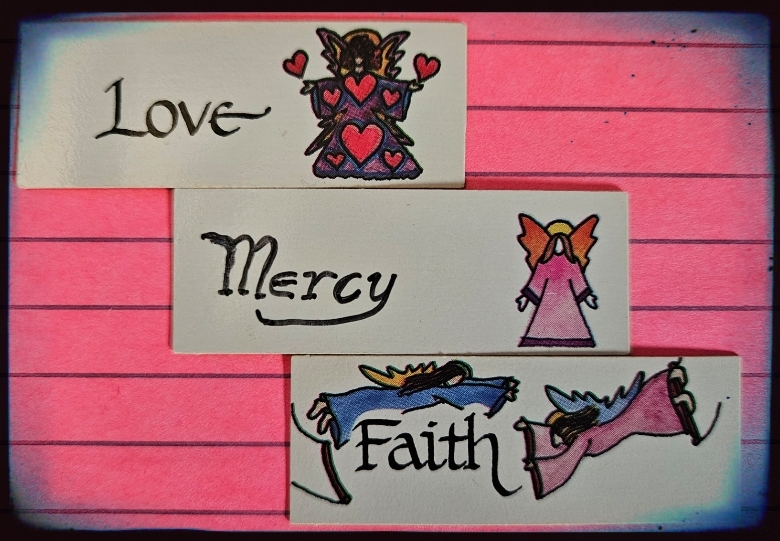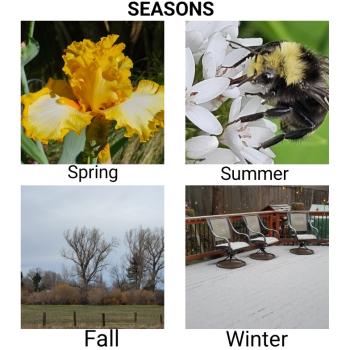
Love and mercy are at the heart of faith. As a parent, my hope was to raise my son to know love and mercy, to know Jesus. There have been times I thought I had failed. But as I see my son Benton now, I see a heart of love and mercy.
My Son Is “Not Religious”
“I’m not religious.” That’s what my long-time friend from church said Benton told her. I’m not sure why she thought it so important to call me. Her sole purpose: to relay her conversation with him when she saw him at work.
It wasn’t news to me. While Benton had a strong faith growing up, and loved going to church with me, something had changed when he went to art school in downtown Portland. At least that’s when it seemed to me to have happened.
That’s when he quit going to church. And when he started wearing fingernail polish and rainbow-colored knee-high socks. If I’d paid more attention, I would have noticed the pink and purple flag patch on his multi-patch jacket.
But I guess none of us really knows what goes on inside another person’s heart and mind. I sometimes wonder if something I said or did made him think I wouldn’t still love him—that God wouldn’t still love him—if he was honest with me about what he was thinking and feeling.
Love and Mercy Transcend Religion
Still, I see in my son the heart of Jesus and compassion for others, a heart filled with love and mercy. He holds a strong sense of justice, a clear view of what’s right and what’s wrong.
- Giving is right. Stealing is wrong.
- Love is right. Hate is wrong.
I know why he’s not “religious.” It’s because that word encompasses a legalism he doesn’t understand or agree with. He sees some who call themselves Christian spewing hatred toward people he cares about—including himself.
Over the past five years I’ve had to wrestle with the revelation that my son is bi-sexual. For two years he was in a serious relationship with someone who preferred the pronoun they. It’s not what I wanted for him. Truth be told, it’s not what I wanted for me, because—well, I don’t have a daughter and since the day I lost my second child to miscarriage when Benton was five, I’ve dreamed of having a daughter-in-law to love. And grandkids. I don’t know whether that will ever happen.
Faith in Jesus, Not the Church
But none of that is as important as my son not losing his faith in Jesus. I don’t care if he loses faith in the church. Frankly, I sometimes lose faith in the church, flawed as it is by the fact that it’s made up of broken and sinful human beings.
Jesus said, “A new command I give you: Love one another. As I have loved you, so you must love one another. By this everyone will know that you are my disciples, if you love one another.” John 13:34–35 (NIV). The church doesn’t always do this, at least not very well. And so, I always did my best to show Benton and his significant other love and grace, like Jesus would.
A Lesson on Grace
I was a children’s leader in Bible Study Fellowship, leading a class of 9- to 11-year-olds to know God better. For a lesson on grace, I once used two stories about my son as practical illustrations of grace.
The first happened when Benton was in the second grade. He took a gallon-sized Ziploc bag full of Pokémon figures to school for show-and-tell one day. The bag was so full we could barely get it zipped closed that morning. When I picked him up after school, that same bag was half empty.
“What happened to all your Pokémon?” I asked.
His reply made me smile at his grace and generosity. “There were some kids in my class who didn’t have any Pokémon and I had extras, so I gave them away.” That’s my kid, always looking out for the less fortunate.
The second illustration involved a photo of Benton when he was about nineteen. It’s a selfie he took with a homeless man in downtown Portland. The man had asked if he had any spare change. In response, Benton took him to a nearby food truck and bought him a hot meal. He told the man to order whatever he wanted. Then he sat and ate with the man and talked with him. I don’t think this was the only time he bought a meal for one of the many homeless in Portland; it’s just the only time he took a selfie. Looking at it now, I wonder if he was wearing nail polish at the time. Then I realize it doesn’t matter if he was.
Are We Sheep or Goats?
In Matthew 25, Jesus talks about the last days, when He will administer judgment on the world. In this parable, He divides the sheep and the goats. Then He blesses the sheep and gives them their reward of eternal life with their God.
The goats don’t fare so well. Jesus curses them and sends them to their eternal punishment. The goats are surprised. They called Him Lord and thought that was enough.
What’s the difference between the sheep and the goats? It’s simple. The sheep fed the hungry, clothed the naked, and visited prisoners. They cared for “the least of these,” and in so doing cared for Jesus Himself. The goats, on the other hand, failed to do anything for others when they saw them in need. They failed to do anything for Jesus other than pay Him lip service.
Nothing is said in Matthew 25 about whether, at some time in their lives, the sheep struggled with one of the multitude of actions the Bible calls sin. Most likely they did—as we all do—and that is how they learned compassion for others. I suspect the goats—though again, Matthew doesn’t say—were great sticklers for man-made rules, but they lacked compassion.
Praying He Believes
When Benton was in high school, his faith seemed strong. He volunteered at church almost every Sunday, running the worship slides. He went on local mission trips with the youth group and enjoyed serving others.
One Sunday morning during his senior year, I checked my email before church. There was a note from my sister with a seven-page letter attached. As I read it, tears blurred my vision and my heart broke. Of all those many words, the hardest were these: “Please don’t pray that I will someday believe, because it isn’t going to happen.”
My son came in and saw me crying. He asked what was wrong and I summarized what the letter said. I told him I was sad that my sister was, and intended to always be, an atheist. Then I said, “Promise me you’ll never stop believing in Jesus.”
“I won’t, Mom, don’t worry,” he replied.
And although he quit going to church with us several years later, I trust that he still believes in the Jesus of Matthew 25 who calls him to love others and to help those in need. I see in him a heart that trusts in these words:
He has shown you, O mortal, what is good. And what does the Lord require of you? To act justly and to love mercy and to walk humbly with your God. (Micah 6:8 NIV).
When I Was Twenty-Five
I think about where I was in my faith at the tender age of twenty-nine, the age my son is now. I most certainly did not walk closely with God. Many of my beliefs and behaviors did not align with Scripture. I believed in Jesus and had even been baptized at twenty-three. But I hadn’t read the Bible much. I hadn’t yet given the Holy Spirit an opportunity to work in my heart. My life was more worldly than spiritual. Unlike my son, I didn’t make a point of giving to those in need.
I’ve since learned there were people praying for me during that time that I didn’t even know. Friends of friends who cared about me. Little by little—and occasionally in huge leaps—the Holy Spirit has made me more like Jesus. One mark-missing attitude or behavior at a time. God never tried to change everything that needed changing all at once. I’m sure that would have overwhelmed me and I would have given up.
Even now I have a long way to go. Don’t we all, if we’re honest? But so often it’s easier to point out the speck of another’s sin and ignore the plank of our own. Jesus even warned us not to do that very thing, but we do it anyway.
Is This a Salvation Issue?
When I think about the choices Benton has made at twenty-nine, I ask myself the all-important question: Is this a salvation issue? What does scripture say about what is required for salvation? It’s not to follow every rule in its hallowed pages. Jesus Himself said, “The work of God is this: to believe in the one he has sent.” (John 6:29 NIV).
Not just to call on His name for your own sake, but to truly believe He is the Son of God and that He died to pay for your sins. Beyond that, any work a believer does is out of gratitude for knowing God’s grace and a desire to extend that grace to others.
One Unforgivable Sin
There is only one unforgivable sin (see Matthew 12:31), and it’s not announcing to your mother that you are bi-sexual or wanting your pronoun to be they. (I’m thankful it’s also not my own personal struggle: holding a grudge when the Word of God says to forgive.)
When I look at all the sins some Christians have no problem overlooking, but then insist this one area of brokenness means you can’t possibly be a Christian, I’m bewildered. Gluttony (have you ever been to a church potluck?), greed (have you seen the private jets of televangelists?), divorce (51% of Protestant marriages end this way), and many more get an easy pass.
Looking for the Heart God Sees
But who are we to look at the outside appearances and make a judgment? As God warned Samuel, “People look at the outward appearance, but the Lord looks at the heart.” (1 Samuel 16:7 NIV). My job as a Christian is to point others to Jesus. Convicting them of sin is the Holy Spirit’s job. I know, because He’s been working on me in the grudge-holding department for the last twenty years. (I’m a bit of a slow learner.)
It is also the Holy Spirit who guides in truth and comforts when we are in pain and broken. As a church, I think we would be much more effective in our witness if we pointed out our own sin and showed how Jesus helped us overcome it. Pointing out what we see as sin in others and claiming they can’t be saved until they overcome that sin on their own makes us hypocrites. And that’s a charge Jesus reserved for the legalistic Pharisees of His day.
It occurred to me as I wrote this article that perhaps it isn’t my son who the Holy Spirit is guiding in truth. Perhaps God ordained this experience because I needed to learn a lesson about grace and walking humbly with Jesus.
Wisdom from a Friend
I have another friend at church. She loves Jesus. And she loves Benton almost as much as I do. She sends him cards to tell him she misses seeing him at church. Not seeing her is one of the things he says he misses about not going to church with me.
One time after the Sunday service, I shared with her how hard it was to process my son’s choices and beliefs about sexuality and sexual identity. She replied, “You know one of my sons is gay, don’t you?” I hadn’t known that. What she said next stuck with me. “The most important thing is that he knows Jesus. Then Jesus will take care of the rest in His time and His way.”
She’s right. If we push those in the LGBTQ community away, judging what we perceive as their sin more harshly than our own, have we advanced the Kingdom of God in any way? Have we been salt and light? Have we loved mercy and walked humbly with our God? I believe we must admit that we haven’t.
And nothing is irrevocable. Grace insists on that.
Pr. Bryan Lowe, Broken Believers.
Closing Prayer on Love and Mercy
Heavenly Father, I pray You would cultivate a heart of love and mercy in me, in my son, and in each person reading this article today. Help us to see others as You see them—as bearers of Your image and people in need of love and mercy. May we, in the final judgment, be sheep and not goats. In Jesus’s name, amen.













